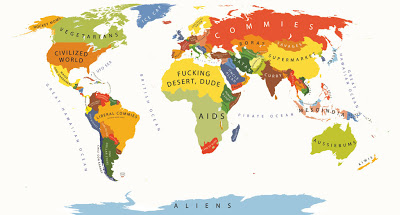 |
| source |
Kenneth Harttgen (Swiss Federal Institute of Technology) and Matthias Opfinger (Leibniz University Hannover) have developed an index of National Identity based on survey responses to eight questions. Things like interest in politics, confidence in the parliament and justice system, and interest in politics – as well as more obvious things like willingness to fight for your country, and national pride.
Using this index, they set out to discover which factors were most closely linked to a high level of national identity (here’s their Working Paper).
Some factors are interesting, but fairly readily understood. High levels of democracy promote national identity (not surprising, given the definition), as do good roads and lots of phones (this is independent of wealth, and is probably to do with the ease that communication within a country). More populous countries also have a higher national identity.
But they also found that religious diversity was linked to increased national identity. On the other hand, religious polarisation (when a country is split into 2 or three large religions) was not.
Now, the really interesting thing was that the strongest link was not between current diversity and national identity, but between religious diversity in 1900 and current national identity. This is evidence that high levels of religious diversity in the past actually seem to strengthen national identity now (or, alternatively, given the number of new countries over the past 100 years, that only a really strong national identity can forge a new nation in the face of religious diversity!).
What Harttgen and Opfinger propose is that religious identity and national identity are flip sides of the same coin. When you have a country with mostly a single religion, people define themselves in terms of a shared religion. But in countries where your neighbours are likely to be of a different religion, religious identity becomes less important, and so people begin to identify themselves in terms of their shared nationality.
However, another interesting finding was that there was no link (positive or negative) between ethnic diversity and national identity. Their explanation for this doesn’t make sense to me:
Two simple examples can make this more easily understandable. First, take two persons of the same nationality, say German. These persons will identify with their religious group as long as they adhere to the same denomination. They share a common set of values, which is based on their religious beliefs. Two persons of the same nationality might not be able to identify with their religion if they adhere to two different denominations, say Protestant and Catholic. Hence, higher religious diversity decreases the importance of religion. But still these people share a broader set of values or cultural beliefs which are based on their national heritage and lets them form a national identity. As a consequence, higher religious diversity, which leads to less importance of religion, increases national identity.
As a second example, consider two US American citizens where one is Caucasian and the other is African American. No matter what their religion is these persons can at least identify on a national level. They share a common set of values which is based on being a US national. This example can help understand why ethnic differences might not affect the formation of a national identity.
Just swap ‘ethnicity’ for religion in the above and you’ll see what I mean. It makes just as much sense (or as little, depending on your perspective). Nevertheless, it does seem to be the case ethnic diversity does not affect national identity (since other studies have found something similar), whereas religious identity does.
It’s also hard to reconcile these findings with previous research that found that religious fervour and national identity were closely linked in countries with a low religious diversity.
I suspect that the somewhat odd definition of ‘national identity’ used in this study is skewing the results!
 This article by Tom Rees was first published on Epiphenom. It is licensed under Creative Commons.
This article by Tom Rees was first published on Epiphenom. It is licensed under Creative Commons.













